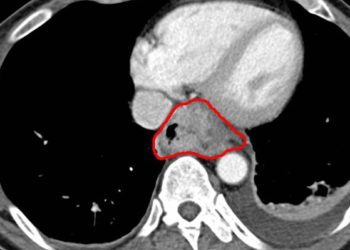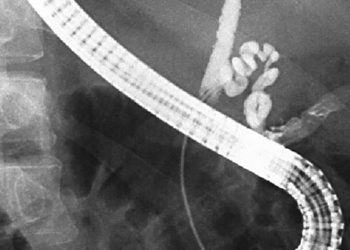Subcutaneous risankizumab maintenance therapy superior to placebo for moderate-severe Crohn’s disease
1. Compared to a placebo (withdrawal) group, patients maintained on subcutaneous risankizumab had greater rates of clinical remission.
2. Adverse events were similar between the treatment and placebo group with worsening of Crohn’s disease and nasopharyngitis being the most common adverse events.
Evidence Rating Level: 1 (Excellent)
Study Rundown: This study is a follow-up to the ADVANCE and MOTIVATE phase 3 drug trials. During the prior trials, participants received induction therapy with IV risankizumab or placebo for moderately to severely active Crohn’s disease. These studies aimed to evaluate the efficacy of induction risankizumab for up to 12 weeks. However, long-term efficacy data on risankizumab is limited. The aim of this FORTIFY trial was to evaluate the efficacy of maintenance therapy with subcutaneous risankizumab for patients who experienced benefit from the initial IV induction therapy. Participants were randomized 1:1:1 to either withdrawal (placebo), 180 mg or 360 mg subcutaneous risankizumab every eight weeks for up to 52 weeks. Subcutaneous risankizumab was well tolerated, with no significant difference in adverse event rates between the treatment versus withdrawal group. Remission was evaluated clinically, by Crohn’s disease activity index (CDAI) score and endoscopically. Greater remission was seen in both the 180 mg and 360 mg risankizumab group compared to the withdrawal group. Limitations of this study include the potential long half-life of risankizumab which would have necessitated longer study duration. Nonetheless, this study demonstrated clinical remission with patients on subcutaneous risankizumab maintenance therapy compared to the withdrawal group.
Click to read the study in The Lancet
Relevant Reading: IL-23–responsive innate lymphoid cells are increased in inflammatory bowel disease
In-Depth [randomized control trial]: The FORTIFY randomized control trial is a phase 3 withdrawal study of subcutaneous risankizumab. Eligibility criteria included previous clinical response in the ADVANCE and MOTIVATE intravenous risankizumab trial. Patients were aged 16-80 years old with Crohn’s disease graded as moderately or severely active by CDAI 220-450. Participants were randomized 1:1:1 to either placebo/withdrawal (n=164), 180 mg (n=157) or 360 mg risankizumab (n=141) every 8 weeks. Primary outcomes were evaluated at week 52. Clinical remission was evaluated on the CDAI scale and endoscopically. Greater clinical remission was reached with the 360 mg group compared to placebo by CDAI score (52% vs 41%, adjusted difference 15%). Clinically, stool frequency and abdominal pain were also greater in the 360 mg group compared to placebo (52% vs 40%, adjusted difference 15%). This was the same for endoscopic remission (47% vs. 22%, adjusted difference 28%). For the 180 mg group, CDAI remission was reached in 55% patients and endoscopic remission in 47% of patients. Adverse events were not significantly different between groups. The most frequently reported adverse events were worsening Crohn’s, nasopharyngitis, and arthralgia. These were experienced most frequently in the withdrawal group.
Image: PD
©2022 2 Minute Medicine, Inc. All rights reserved. No works may be reproduced without expressed written consent from 2 Minute Medicine, Inc. Inquire about licensing here. No article should be construed as medical advice and is not intended as such by the authors or by 2 Minute Medicine, Inc.






![The ABCD2 score: Risk of stroke after Transient Ischemic Attack (TIA) [Classics Series]](https://www.2minutemedicine.com/wp-content/uploads/2013/05/web-cover-classics-with-logo-medicine-BW-small-jpg-75x75.jpg)
